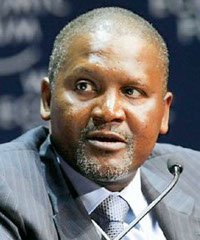Why SA’s Tiger Brands bought a stake in one of Aliko Dangote’s companies
South African consumer goods giant Tiger Brands last month announced that it has bought a 63.35% stake in Dangote Flour Mills (DFM), one of Nigeria’s largest flour and pasta producers.

Aliko Dangote
DFM was started by Nigerian billionaire Aliko Dangote, whose Dangote Group has significant interests in a range of industries, from cement to sugar. As part of the deal, the Dangote Group will retain a 10% strategic stake in DFM. Aliko Dangote will also remain chairman of DFM.
Last year Tiger Brands made its first two acquisitions in Nigeria when it bought biscuit manufacturer Deli Foods and secured a 49% stake in UAC of Nigeria’s food and beverage businesses.
But what was Tiger Brands’ motivation for paying just over 30 billion Nigerian naira (more than 190 million US dollars) for a stake in DFM? The company didn’t respond to How we made it in Africa’s requests for comment, but an official statement provides some insight.
Strategic growth market
“Nigeria is a key strategic growth market in West Africa, the second largest African economy and one of the fastest growing economies in sub-Saharan Africa. With an estimated population of 160 million and projected average real GDP growth forecast over the next three years of approximately 7% per annum,” says Tiger Brands.
Tiger Brands also believes the transaction will add scale to its existing Nigerian businesses and allow it to take advantage of the market opportunities in Nigeria’s food sector.
DFM – a market leader
“DFM is a market leader in both the flour and pasta market segment of the Nigerian consumer food sector with strong branding, production and distribution capabilities,” reads the statement.
DFM started its flour milling business in 1999 as a division of the Dangote Group. It is currently the second largest flour milling company in Nigeria with a market share of around 30%; its share in the pasta market is approximately 40%.
Tiger Brands is also confident that it can use its experience in the food sector to further develop and grow DFM.
A hunger for Africa
Over the past few years Tiger Brands has increased its footprint in the rest of Africa. In addition to Nigeria, it currently has operations in Cameroon, Ethiopia, Kenya and Zimbabwe.
Thushen Govender, head of business development at Tiger Brands, recently said in an interview that when deciding where to invest, Tiger Brands first performs an analysis of African countries by assessing the socio-economic environment, consumer-driven factors, GDP, GDP per capita, population, etc.
“Countries such as Nigeria feature quite highly given their improving macro and socio-economic conditions. Egypt and Ethiopia will feature highly because of their populations, and this is of importance to consumer-driven organisations over the medium to longer term. If one were to consider growth alone, Angola, Ethiopia, and Nigeria would all feature highly,” he said.

